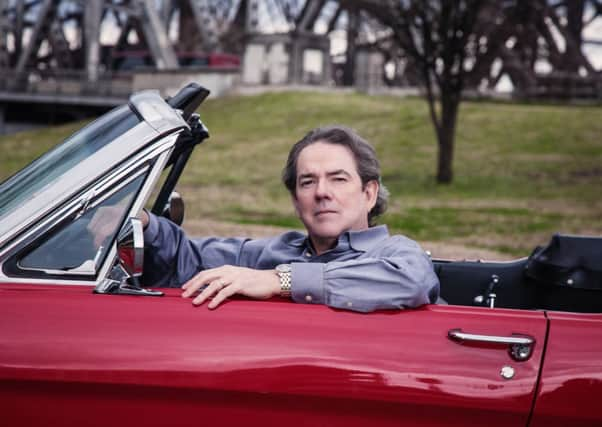Music interview: Jimmy Webb, the songwriter to stars who turned down Elvis


“My suggestion would be that you ask questions that you want the answers to because I’m a guy that will talk endlessly about the same thing, you need to push me along,” says the composer of some of the finest and most sophisticated pop songs of the last half-century, including Wichita Lineman, Galveston, MacArthur Park and By the Time I Get to Phoenix.
It is indeed easy to let the 68-year-old Oklahoma-born composer, lyricist and arranger discourse at length on the art of songwriting and the spark that seems to be missing from much modern pop music – it makes for fascinating and insightful conversation.
Advertisement
Hide AdAdvertisement
Hide AdOf his new show, ‘An evening of songs and stories’, which he’s bringing to Leeds City Varieties next week he says: “I sort of pull back the curtain on what goes on between songwriters and artists when they’re working out these miracles.
“I believe that every hit record is a small miracle because so many factors have to combine in such a synchronistic way to create a hit record. It’s just a small moment of magic when the right artist connects with the right song and suddenly it’s on the radio and it’s a part of the public consciousness.”
Webb got his first job as a songwriter in Los Angeles at the age of 18, writing for Tamla Motown. His father, a former Marine turned Baptist minister, disapproved, telling him: “Son, this songwriting thing is only going to break your heart.”
Webb recalls: “I have to say at the same time he took $40 out of his pocket and gave it to me. It was a laugh for a while because it was like, ‘Well, Dad, look at me – songwriting certainly didn’t break my heart’. Yet in retrospect I have to admit that he was exactly right – that it has over the length of my career, which is 45, going on 50 years that I’ve been in the business making albums, some successful, some not successful, some projects that were like building the Great Wall of China that simply went by like a mosquito without being noticed, it has broken my heart several times and so the old man was actually spot-on with that.”
Advertisement
Hide AdAdvertisement
Hide AdWebb worked many times with Glen Campbell over the years. Of all the recordings that the country singer made of Webb’s songs, Wichita Lineman remains his favourite. “It was a perfect marriage between a song and a voice,” he says. “It’s amazing today to listen to that record and realise how highly pitched his voice is because all of our voices have dropped in the intervening years. But he sung so high and he was such a smooth singer and there was a note – it was very plaintive, almost like a dying fall – to his intonation, to things that are almost indescribable, almost intangible, but I don’t think that the record has lost any gravitas since it was made.
“You put it on and it still sounds as though that song and that singer were meant to be together.”
The songwriter also made two albums with the hell raising actor Richard Harris. Harris turned Webb’s complex seven-minute song MacArthur Park into a massive smash.
Webb says of their working relationship: “It was wild, it was funny, it was very emotional, he was quite a mercurial fella, he could be up and down and up and down again in a span of 10 or 12 minutes so sometimes it was a little bit of a rollercoaster ride.
Advertisement
Hide AdAdvertisement
Hide Ad“I like to say that he was the man who taught me to drink – we used to go out and have black velvets, we would drink black velvets with Jameson chasers and just get crazy. I can remember when we did our recordings in London, we would go in his Phantom 5 and we would take a pitcher of Pimm’s and we would balance it between us in the back of the car so as not to spoil the upholstery. When we’d get to the recording studio we put the pitcher on a stool beside the microphone and Richard would start singing – and when the Pimm’s was gone the session was over.
“We would do tons of takes, there was a fair amount of editing on those recordings but I still stand by them and I stand by his performances – they were quite dramatic.
“We ended up cutting a record that pretty much changed the record business. I don’t think anyone can diminish the contribution that we made together. When I play a concert I have to sign those albums every night – everybody’s still got their Richard Harris albums.”
One missed opportunity in Webb’s career was the chance to record with Elvis Presley.
Advertisement
Hide AdAdvertisement
Hide Ad“It was certainly nothing that I did that prevented me from working with him,” Webb says, pointing the blame at Elvis’s notoriously controlling manager Colonel Tom Parker.
“I have bootleg recordings of Elvis doing MacArthur Park and By the Time I Get to Phoenix. We talked about recording together, but Colonel Tom Parker insisted on 100 per cent of the publishing. I was being recorded by Mr Sinatra and Tony Bennett and Glen Campbell and I just didn’t feel that I was in a position where I had to make that kind of a sacrifice.
“In retrospect I would have loved to have had a record with him, but I guess I stood on principle and it wouldn’t be the first time or the last time in life that I would cut off my nose to spite my face – I’m extremely good at that,” he laughs.
n Jimmy Webb is at Leeds City Varieties on April 7. www.cityvarieties.co.uk